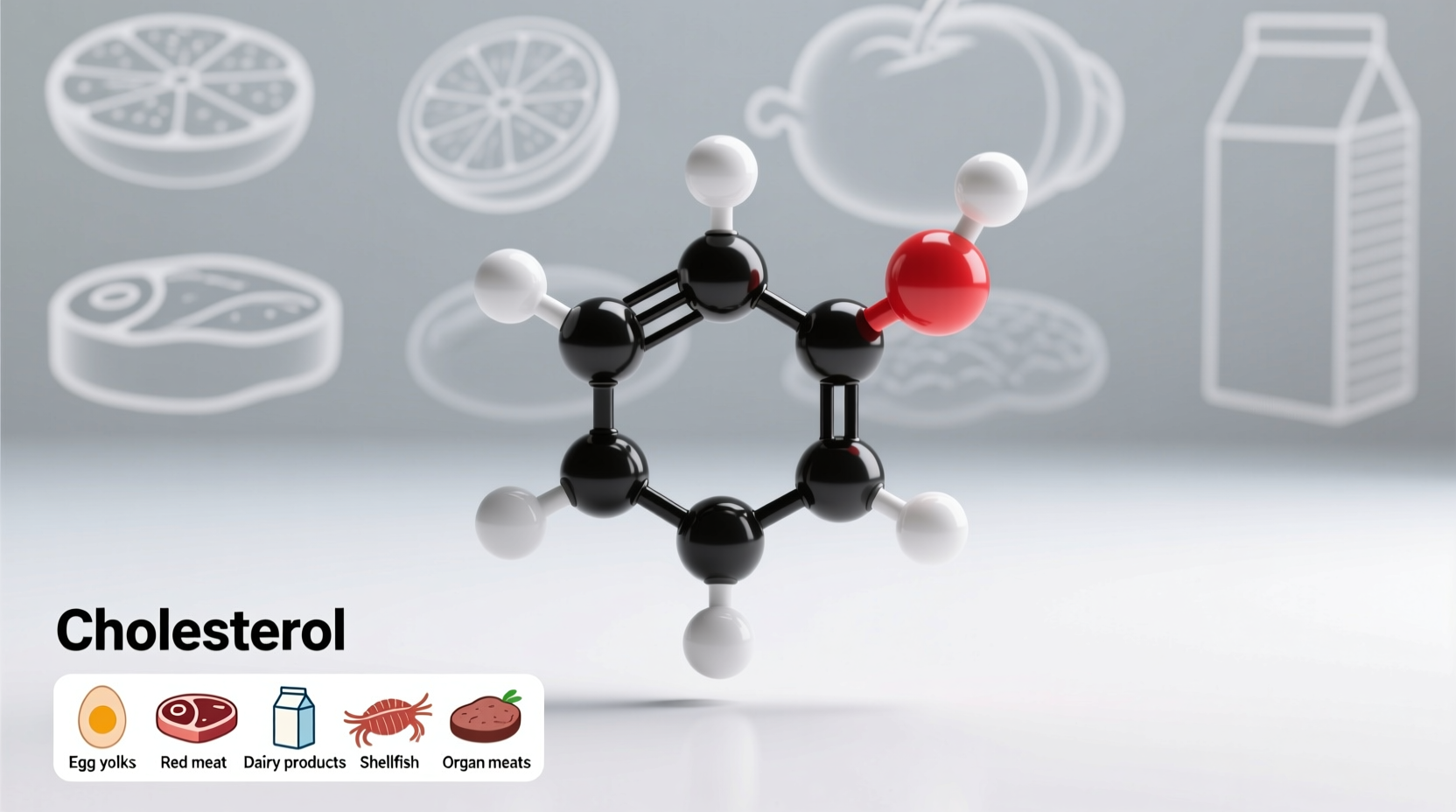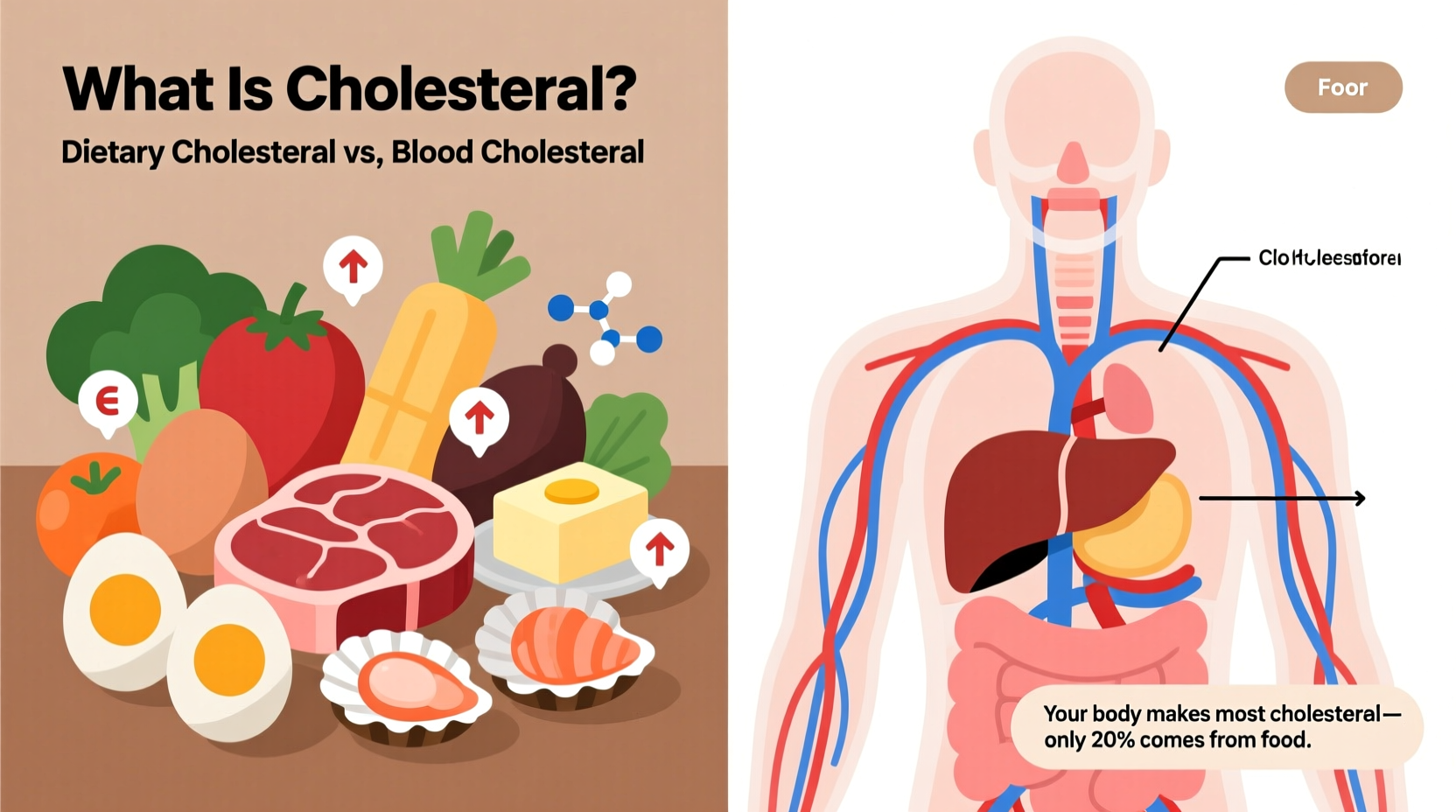Cholesterol in food refers to the waxy, fat-like substance naturally present in animal-based products like eggs, meat, and dairy. Unlike blood cholesterol, dietary cholesterol has minimal impact on most people's blood cholesterol levels according to current scientific consensus from the American Heart Association and NIH.
Understanding dietary cholesterol is crucial for making informed food choices without unnecessary fear. Many people still operate under outdated information about cholesterol's role in heart health, leading to confusion about which foods to include or avoid. This guide cuts through the misinformation with evidence-based facts about where cholesterol appears in food, how it affects your body, and what actually matters for cardiovascular wellness.
Cholesterol Demystified: What It Is and Where It Lives in Your Food
Cholesterol is a lipid molecule essential for building cell membranes, producing hormones, and creating vitamin D. While your liver produces all the cholesterol your body needs, it also appears naturally in animal-derived foods. Plant-based foods contain no cholesterol.
"Dietary cholesterol differs fundamentally from blood cholesterol," explains Dr. Alice Lichtenstein, senior scientist at Tufts University's Friedman School of Nutrition. "The relationship between the cholesterol you eat and the cholesterol circulating in your bloodstream is far more complex than previously believed."

Food Sources Breakdown: What Contains Cholesterol and How Much
Not all cholesterol-containing foods impact your diet equally. The following table shows common foods and their cholesterol content per standard serving, based on USDA FoodData Central data:
| Food | Standard Serving | Cholesterol (mg) | Context Comparison |
|---|---|---|---|
| Egg (whole) | 1 large (50g) | 186 | 31% of daily value |
| Chicken liver | 3 oz (85g) | 331 | 110% of daily value |
| Salmon | 3 oz (85g) | 52 | 17% of daily value |
| Whole milk | 1 cup (244g) | 33 | 11% of daily value |
| Butter | 1 tbsp (14g) | 31 | 10% of daily value |
Notice that while eggs contain significant cholesterol, they also deliver high-quality protein and essential nutrients. The key isn't necessarily avoiding cholesterol-containing foods altogether, but understanding how they fit within your overall dietary pattern.
Scientific Understanding Evolution: From Villain to Nuanced Player
The narrative around dietary cholesterol has dramatically shifted over the past few decades. This timeline reveals how scientific understanding has evolved:
- 1960s-1980s: Dietary cholesterol strongly linked to heart disease; strict limits recommended (300mg daily)
- 1990s: Focus shifts to saturated fats as primary dietary concern for heart health
- 2013: American Heart Association states "evidence is insufficient to set a specific limit for dietary cholesterol"
- 2015-2020 Dietary Guidelines: Removes previous cholesterol limit, emphasizing overall healthy eating patterns instead
- 2020-present: Current consensus recognizes minimal impact of dietary cholesterol on blood cholesterol for most people
This evolution reflects increasingly sophisticated research methods and a better understanding of how nutrients interact within complex biological systems.
When Dietary Cholesterol Matters: Context Boundaries You Should Know
While dietary cholesterol has less impact than previously thought, certain situations warrant more attention:
- Genetic factors: About 25% of people are "hyper-responders" whose blood cholesterol rises more significantly from dietary cholesterol (NIH, 2022)
- Diabetes management: Those with diabetes may need closer monitoring of dietary cholesterol intake
- Overall dietary pattern: Cholesterol in processed meats carries different implications than cholesterol in fish or eggs
- Individual health status: Those with familial hypercholesterolemia require specialized guidance
The National Institutes of Health emphasizes that "focusing solely on dietary cholesterol misses the bigger picture." Their research shows that saturated and trans fats have a much stronger influence on blood cholesterol levels than dietary cholesterol itself. This crucial distinction helps explain why foods like eggs—which contain cholesterol but minimal saturated fat—don't negatively impact heart health for most people.
Practical Food Choices: Moving Beyond Cholesterol Counting
Rather than obsessing over cholesterol numbers, focus on these evidence-based strategies:
- Prioritize food quality: Choose pasture-raised eggs and grass-fed meats when possible, which contain more beneficial nutrients
- Balance your plate: Pair cholesterol-containing foods with fiber-rich vegetables that help with cholesterol metabolism
- Read labels wisely: Check for trans fats (listed as "partially hydrogenated oils") which are far more harmful than dietary cholesterol
- Cooking methods matter: Grill or bake instead of deep-frying to avoid creating harmful compounds
- Pattern over perfection: One high-cholesterol meal won't derail your health; consistent dietary patterns determine outcomes
The American Heart Association's 2023 update confirms that "a heart-healthy dietary pattern that emphasizes vegetables, fruits, whole grains, lean protein sources, and healthy fats remains the cornerstone of cardiovascular prevention." This approach naturally manages cholesterol concerns without requiring obsessive tracking.
Common Misconceptions Clarified
Let's address frequent cholesterol confusions with current scientific understanding:
- Myth: All cholesterol is bad
- Fact: Your body needs cholesterol to function; the issue is having too much LDL ("bad") cholesterol in your blood
- Myth: Eating cholesterol directly raises blood cholesterol significantly
- Fact: For most people, dietary cholesterol has minimal impact on blood cholesterol levels compared to saturated and trans fats
- Myth: Plant-based foods contain cholesterol
- Fact: Only animal products contain dietary cholesterol; plants contain phytosterols which may actually help lower blood cholesterol
Remember that cholesterol isn't the dietary villain it was once portrayed to be. The real concern for heart health comes from processed foods high in unhealthy fats, added sugars, and refined carbohydrates—not from whole, nutrient-dense foods that happen to contain cholesterol.











 浙公网安备
33010002000092号
浙公网安备
33010002000092号 浙B2-20120091-4
浙B2-20120091-4